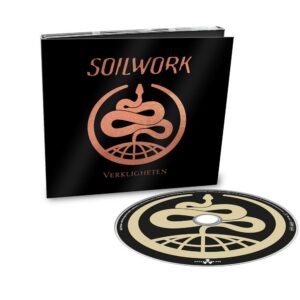
It’s been four years since the last Soilwork album (2015’s excellent the ride majestic) with only a compilation released in between to keep the flame alight (2016’s death resonance). Now back with a new drummer on board (Bastian Thusgaard, who joined the band in 2016 to replace long-time member Dirk Verbeuuren) the band seem to have a renewed sense of purpose, and with Thomas “Plec” Johansson on board for production duties, the band have turned in a taut, heavy album that speaks to their previous strengths whilst offering some new twists to proceedings.
Certainly the band set the scene in fine style. The neo-progressive opener, Verkligheten draws on squelchy synths and a gorgeous, Gilmour-esque liquid slide guitar that is quite unlike anything we’ve heard from Soilwork before. Sweetly reflective, it suggests a newfound maturity to the band’s composition and it segues neatly into arrival, a track that wastes little time in unleashing a ferocious, battering assault of double kick drums and hard riffing. It sounds immense and Bjorn appears to take great delight in wrecking his vocal chords against the swirling maelstrom the band conjure. Of course, this being Soilwork, there is still a monstrously melodic chorus for listeners to get their teeth into, but it’s delivered with a laser-guided precision that sees things kept firmly on the right side of heavy no matter how soaring the vocals. Bleeder Despoiler, which sounds like it belongs on a Fear Factory album, draws from the Devin Townsend school of production, with gleaming banks of synths underscoring the dense riffing and industrial-strength percussion. It works well and is a stand-out track on the record. With an ethereal title, full moon shoals shifts from an eerie, atmospheric intro to mid-tempo piece with a strong sense of melody. New boy Bastian proves himself to be a deft exponent behind the kit, his inventive patterns driving the song in unexpected directions, although the synths do get a bit overpowering in places. The band appear to take things down a notch further with the intro to The nurturing glance recalling the elegiac tones of Katatonia, although a sting awaits those who find themselves too lulled by the winding guitar motif, and Soilwork throw in some taut heavy metal shapes into the mix suggesting that their formative years were not uninfluenced by the likes of W.A.S.P. In contrast, When the universe spoke is pure, gleaming melo-death with plenty of Soilwork attitude and it brings the first half to a close on a propulsive high.
With a tough, industrial backbone, the synth-heavy Stalfagel pairs ultra-precise riffing with melodic nous to good effect, the overall tone not dissimilar to the path latter-day In Flames have trod. Rather more brutal is the wolves are back in town, a track that seeks to emphasise the death metal elements of the band’s sound in the verse, although they can’t resist tearing through a super-melodic chorus. Nonetheless, fans will love the feral riffing the band deploy here, as they do on the evil groove of Witan, a track that starts out as a heavy pop anthem only for Soilwork to suddenly unleash a vicious riff that takes the track in a much better direction than its intro implies. A more sedate offering is up next in the form of the anthemic the ageless whisper, which has an introspective melody woven into the very fabric of its being, even as the band employ their typical sturm und drang on the verses. Strings dominate the intro to needles and kin, a track featuring a guest slot from Amorphis’ Tomi Joutsen on vocals, but the listener will be more enticed by the vocal interplay between Bjorn and Tomi and the collaboration is a fruitful one. The album’s final track, you aquiver, also features a guest appearance, this time from Exes for Eyes’ Dave Sheldon and, with a strong pop edge, it brings the album to a successful close.
Although Soilwork have refined their sound, they have remained remarkably consistent over the years and Verkligheten is no exception. The title track aside, the album is pretty much an affirmation of the band’s strengths and, although bleeder despoiler and Stalfagel stand out as particularly impressive examples of the band’s modus operandi, the album as a whole feels more like a consolidation than an advance. That’s not to say it’s a bad record in any way – all the Soilwork staples are in place: strong melodies, taught riffing and a typically impressive musicianship – but it will do little to win over those not already enamoured with the band’s sound. A good showing then, but after four years it would be nice to have seen the band stretch a little more beyond their comfort zone. 7



